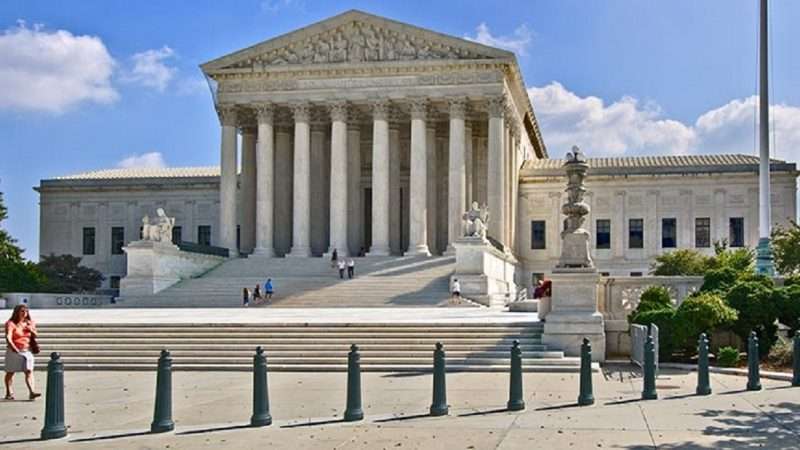
Florida has barred hundreds of thousands of residents with felony records from voting without first paying off their court fines and fees. Earlier this year a federal judge ordered the state to let many of those citizens vote, but another court then temporarily blocked the order—and today, by a 6–3 vote, the U.S. Supreme Court declined to intervene.
The ruling is a setback for voting rights activists and civil liberties groups’ attempts to re-enfranchise an estimated 775,000 Floridians with felony records in time for this year’s elections. It’s a victory for Republican Gov. Ron DeSantis and the Florida state government, which have been fighting multiple lawsuits challenging a law that requires Floridians with felony records to prove they’ve paid off all their outstanding fines before they can register to vote.
U.S. District Court Judge Robert Hinkle ruled in May that the Florida government could condition voting on paying off court fines and fees, but he also ruled that blocking offenders who are too poor to pay their fines is discriminatory, violating both the 14th Amendment’s Equal Protection Clause and the 24th Amendment’s prohibition on poll taxes.
After the Florida government appealed, the 11th Circuit Court of Appeals issued a temporary stay on Hinkle’s ruling. Earlier this month, the Campaign Legal Center petitioned the Supreme Court to lift the stay. A majority of the Supreme Court’s conservative justices, joined by Justice Stephen Breyer, declined to do so in an unsigned opinion.
“This is a deeply disappointing decision,” Paul Smith, vice president of the Campaign Legal Center, said in a statement. “Florida’s voters spoke loud and clear when nearly two-thirds of them supported rights restoration at the ballot box in 2018. The Supreme Court stood by as the Eleventh Circuit prevented hundreds of thousands of otherwise eligible voters from participating in Florida’s primary election simply because they can’t afford to pay fines and fees.”
Liberal Supreme Court justices Elena Kagan, Sonia Sotomayor, and Ruth Bader Ginsburg dissented, writing that today’s decision “prevents thousands of otherwise eligible voters from participating in Florida’s primary election simply because they are poor.”
Sotomayor also criticized the 11th Circuit’s stay.
“The Eleventh Circuit’s ‘bare order’ staying the District Court’s decision does not ‘provide any factual findings or indeed any reasoning of its own,’ and ‘[t]here has been no explanation given by the Court of Appeals showing the ruling and findings of the District Court to be incorrect,'” she wrote.
The fight over felon voting rights in Florida began in 2018, immediately after Florida voters decisively passed Amendment 4, a constitutional amendment restoring voting rights to those with felony records. Florida was one of a small group of states that enforced a lifetime voting ban for anyone with a felony record, and Amendment 4 was hailed as one of the largest single expansions of the franchise in recent history.
Arguments over how to implement the law began immediately. The amendment’s language said that voting rights would be restored “upon completion of all terms of sentence including parole or probation,” but it did not say whether “all terms” included financial obligations imposed by courts.
Florida Republicans, including Gov. DeSantis, argued that it did, and they passed a bill making voting eligibility contingent on first paying off court fines and fees. Civil rights groups say that amounts to a poll tax, and several of them filed lawsuits last year challenging the new law at both the state and federal levels.
The Fines & Fees Justice Center has found that Florida courts, which are funded almost entirely through fines and fees, had “115 different types of fees and surcharges, the second highest number in the country.” As a result, WLRN reported, Florida felons would have to pay back hundreds of millions of dollars to restore their voting rights.
At trial this April, state officials repeatedly admitted they couldn’t easily track how much someone owed in criminal fines and fees; the documents were often scattered across multiple county agencies. In a withering opinion, Hinkle noted that “even with a team of attorneys and unlimited time, the State has been unable to show how much each plaintiff must pay to vote under the State’s view of the law.”
Hinkle’s ruled Florida must create a clear and quick system for determining voter eligibility, and that the state couldn’t disqualify felony offenders who had a court-appointed attorney or had their fines converted into civil liens, which could potentially restore voting rights to a massive number of those with felony records in the state.
But Hinkle’s order is now stayed until after an August 18 hearing before the 11th Circuit Court of Appeals, the same day as Florida’s primary elections. It’s unclear whether the case will be cleared up before the general election in November.
The Supreme Court’s decision not to lift the stay means that currently disenfranchised Florida voters will be blocked from registering for Florida’s primary elections before the July 20 deadline.
“My heart went out to the countless number of returned citizens who were looking forward to participating in an election maybe for the first time, or the first time in a long time,” Desmond Meade, president of the Florida Rights Restoration Coalition, told The Washington Post. “To see their hopes dashed like that, because of politics, that really brought me to tears.”
from Latest – Reason.com https://ift.tt/3eBvyGH
via IFTTT